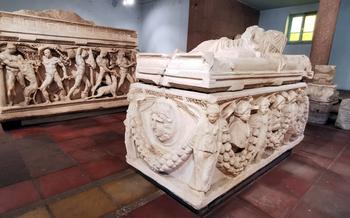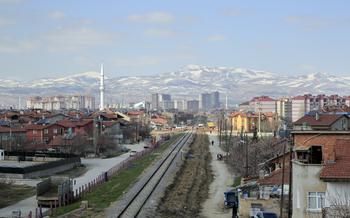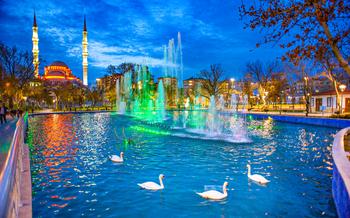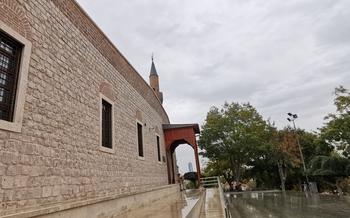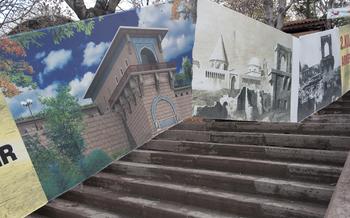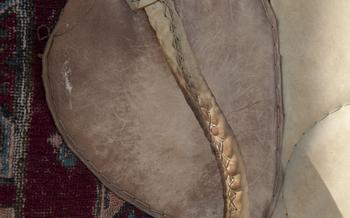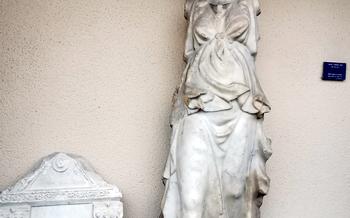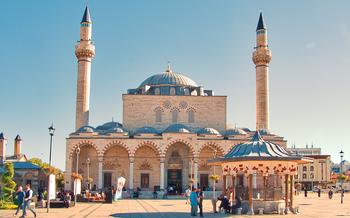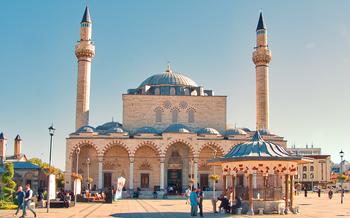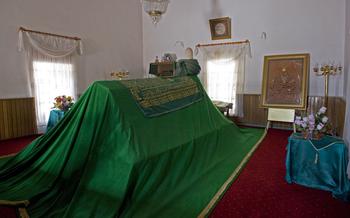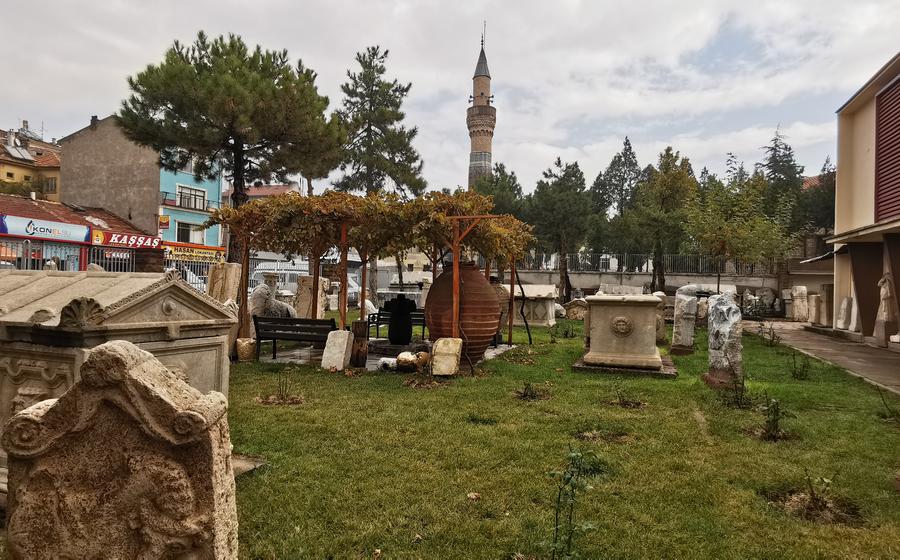
Konya Mevlana Culture Center
- The Konya Mevlana Culture Center: A Spiritual Haven
- Exploring the Mausoleum of Rumi
- The Sema Ceremony: A Whirling Dervish Performance
- The Mevlana Museum: A Treasure Trove of Sufi Artifacts
- The Rose Garden: A Symbol of Beauty and Spirituality
- Attending a Sufi Music Concert
- Visiting the Konya Archaeological Museum
- Exploring the Sille Village
- Indulging in Local Cuisine
- Shopping for Handicrafts and Souvenirs
- Taking a Turkish Bath (Hamam) Experience
- Visiting the Alaeddin Mosque: A Journey through History and Spirituality
- Exploring the Beyhekim Park
- Participating in a Whirling Dervish Workshop
- Insider Tip: Respectful Etiquette and Dress Code
The Konya Mevlana Culture Center: A Spiritual Haven
In the heart of Konya, a city steeped in rich history and spirituality, lies the Konya Mevlana Culture Center, a beacon of peace and enlightenment. This iconic site, dedicated to the teachings and legacy of the renowned Sufi mystic Rumi, welcomes visitors from around the world to immerse themselves in the profound beauty and wisdom of Mevlana's philosophy.
Established in 1964, the Konya Mevlana Culture Center encompasses the Mevlana Mausoleum, the Sema Hall, the Mevlana Museum, and the Rose Garden, each offering a unique aspect of Rumi's life and teachings. The center has become a pilgrimage site for those seeking spiritual guidance and a deeper understanding of Sufism, attracting millions of visitors annually.
The architectural splendor of the Konya Mevlana Culture Center is a testament to the enduring influence of Rumi's teachings. The intricate carvings, vibrant tilework, and graceful domes reflect the essence of Islamic art and architecture. The center exudes an atmosphere of serenity and spirituality, inviting visitors to embark on a journey of self-discovery and inner peace.
Exploring the Mausoleum of Rumi
The mausoleum of Rumi is the centerpiece of the Konya Mevlana Culture Center and a site of immense spiritual significance. Built in the 13th century, it serves as the final resting place of the revered Sufi mystic, Jalaluddin Rumi. The mausoleum's architectural beauty and intricate details reflect the profound reverence for Rumi's teachings and his enduring legacy.
The exterior of the mausoleum is adorned with stunning turquoise tiles, intricate carvings, and calligraphy that evoke a sense of awe and tranquility. The interior is equally captivating, with a high-domed ceiling, elegant chandeliers, and walls adorned with verses from Rumi's poetry. The centerpiece of the mausoleum is Rumi's tomb, a magnificent sarcophagus crafted from intricately carved wood and inlaid with mother-of-pearl and ivory.
Visitors to the mausoleum are often struck by the palpable sense of peace and tranquility that pervades the space. The mausoleum is a place where pilgrims and visitors alike come to pay homage to Rumi, seek spiritual guidance, and find solace in his teachings. The air is filled with the gentle murmur of prayers, the recitation of Rumi's poetry, and the faint aroma of incense.
For those seeking a deeper connection with Rumi's teachings, the mausoleum offers a unique opportunity to immerse oneself in his wisdom and spirituality. Visitors can spend hours here, reading his poetry, contemplating his teachings, and finding inspiration in his words. The mausoleum is not just a historical site but a living testament to the enduring power of Rumi's message of love, compassion, and spiritual awakening.
The Sema Ceremony: A Whirling Dervish Performance
The Sema ceremony, also known as the Whirling Dervish ceremony, is a mystical and captivating performance that is deeply rooted in Sufi tradition. Originating in the 13th century, this ceremony is a form of spiritual expression that symbolizes the journey of the soul towards divine unity.
During the Sema, dervishes, clad in long white robes, gracefully twirl in a synchronized motion, their arms outstretched like wings. The rhythmic spinning represents the rotation of the planets, the cycle of life and death, and the connection between the physical and spiritual realms.
The ceremony is accompanied by mesmerizing music, played on traditional instruments such as the ney flute and the kudüm drum. The melodies and chanting create a trance-like atmosphere, enhancing the spiritual and emotional impact of the performance.
Witnessing the Sema ceremony is a truly awe-inspiring experience that leaves visitors with a profound sense of peace and tranquility. It is an opportunity to delve into the heart of Sufism and gain a deeper understanding of its mystical teachings.
The Mevlana Museum: A Treasure Trove of Sufi Artifacts
Established in the early 20th century, the Mevlana Museum stands as a testament to the rich legacy and teachings of Rumi. Within its hallowed halls, visitors are granted an intimate glimpse into the life and works of this revered Sufi mystic. Among the museum's prized possessions are Rumi's personal belongings, including his clothing, prayer rug, and writing instruments. These artifacts offer a tangible connection to the great master, evoking a sense of his presence and the profound impact of his teachings.
In addition to Rumi's personal effects, the museum houses a remarkable collection of historical manuscripts, calligraphy, and illuminated Qur'ans. These treasures showcase the artistry and craftsmanship of the era, providing insights into the cultural and intellectual climate in which Rumi lived and taught. Through interactive exhibits and educational displays, the museum invites visitors to delve deeper into Rumi's teachings, exploring the essence of Sufism and its enduring influence on Islamic thought and spirituality.
A visit to the Mevlana Museum is a journey through time, transporting visitors to the heart of Rumi's world. It is a place where the past and present intertwine, where the teachings of a 13th-century mystic continue to resonate with seekers of truth and wisdom.
The Rose Garden: A Symbol of Beauty and Spirituality
In the heart of the Konya Mevlana Culture Center lies a serene oasis, the Rose Garden. Its existence holds profound significance, embodying the teachings of Rumi, who revered roses as symbols of divine love and beauty. The garden bursts into a vibrant tapestry of colors, with roses of every hue blooming in harmony. The air is perfumed with their intoxicating fragrance, creating an atmosphere of tranquility and serenity.
As you stroll through the garden, let the beauty of the roses captivate your senses. Each bloom is a delicate masterpiece, a testament to the wonders of nature and the divine. Contemplate the symbolism of the rose, its thorns representing the challenges we face in life, while its petals symbolize the beauty and resilience that can emerge from those struggles.
Find a tranquil spot amidst the fragrant blooms and take a moment to reflect. Allow the beauty of the roses to soothe your soul, inspiring you to embrace love, compassion, and gratitude. The Rose Garden is a reminder that even in the midst of life's complexities, there is always beauty to be found, just as Rumi himself found solace and inspiration in the presence of these magnificent flowers.
Attending a Sufi Music Concert
Music holds a profound significance in the Sufi tradition, serving as a medium for spiritual expression and connection with the divine. Konya offers a vibrant music scene, with regular concerts and performances showcasing the mesmerizing melodies and rhythms of Sufi music. Attending a Sufi music concert is an immersive experience that allows visitors to witness the power of music to uplift and transform.
The concerts typically take place in intimate settings, such as traditional Sufi lodges or cultural centers. As the musicians begin to play, a palpable energy fills the air, enveloping the audience in a tapestry of sound. The melodies are often haunting and evocative, featuring traditional instruments like the ney (reed flute), oud (lute), and daf (frame drum). The lyrics, often drawn from Sufi poetry, express themes of love, longing, and the search for truth.
The musicians themselves are often highly skilled and respected, embodying the essence of the Sufi tradition. Their performances are not merely technical displays, but deeply spiritual acts of devotion. As they play, they enter a state of trance, their bodies swaying and their eyes closed in concentration. The music becomes a vehicle for their spiritual journey, transporting them and the audience to a realm of transcendence.
For visitors, attending a Sufi music concert is an opportunity to experience the transformative power of music firsthand. The melodies and rhythms have a deeply emotional and spiritual impact, stirring the soul and evoking a sense of peace and tranquility. The concerts provide a glimpse into the rich cultural heritage of Konya and offer a unique opportunity to connect with the mystical traditions of Sufism.
Visiting the Konya Archaeological Museum
The Konya Archaeological Museum stands as a testament to the rich cultural heritage of the city, offering a captivating journey through the ages. Established in 1901, the museum houses an impressive collection of artifacts unearthed from various archaeological sites in and around Konya.
As you step into the museum's grand halls, you will be greeted by a diverse array of exhibits, each telling a unique story about the region's past. From prehistoric tools and pottery to intricate sculptures and mosaics, the museum offers a glimpse into the lives and traditions of ancient civilizations that once thrived in this land.
Among the highlights of the collection are artifacts from the Chalcolithic period, including finely crafted copper tools and ornaments. The Phrygian section showcases stunning bronze sculptures and jewelry, revealing the artistic prowess of this ancient civilization.
The museum also boasts a remarkable collection of Hellenistic and Roman artifacts, including marble statues, ceramics, and coins. These relics provide valuable insights into the cultural exchanges and influences that shaped the region during the classical era.
For those interested in the Byzantine period, the museum houses a collection of mosaics, frescoes, and religious artifacts, shedding light on the region's Christian heritage.
The Konya Archaeological Museum not only serves as a repository of ancient treasures but also as an educational center, offering interactive exhibits and guided tours. Through its comprehensive collection and engaging displays, the museum invites visitors to embark on a journey of discovery, unraveling the rich tapestry of Konya's past.
Exploring the Sille Village
Nestled just 8 kilometers from the heart of Konya lies the picturesque village of Sille, a hidden gem that offers a unique blend of history, nature, and traditional charm. With its cobblestone streets, ancient churches, and stunning natural surroundings, Sille promises an unforgettable experience for travelers seeking authenticity and tranquility.
The village boasts a rich and diverse history, dating back to the Roman and Byzantine periods. Its unique architectural heritage is reflected in the beautifully preserved stone houses, many of which have been converted into charming cafes, boutiques, and guesthouses. As you wander through the narrow streets, you'll be captivated by the intricate carvings and decorative elements that adorn the buildings, each telling a story of Sille's past.
Nature enthusiasts will find solace in Sille's breathtaking landscapes. The village is surrounded by rolling hills, lush greenery, and orchards, providing ample opportunities for hiking, cycling, and nature walks. The Sille River, with its crystal-clear waters and cascading waterfalls, adds to the scenic beauty of the area. Whether you're seeking a leisurely stroll along the riverbank or an invigorating hike up the surrounding hills, Sille offers a sanctuary for those seeking communion with nature.
Take advantage of your visit to Sille to explore its historical landmarks, including the magnificent Sille Monastery. This ancient monastery, dating back to the 5th century, offers a glimpse into the region's rich Christian heritage. Admire the intricate frescoes and mosaics that adorn the walls of the monastery, depicting scenes from the Bible and the lives of early Christian saints.
Sille is also home to the Sille Archaeological Museum, which houses a collection of artifacts and relics from the village's long and storied past. From ancient pottery and tools to inscriptions and sculptures, the museum provides valuable insights into the lives of the people who inhabited this region throughout the centuries.
With its blend of history, nature, and traditional charm, Sille offers a unique and enriching experience for travelers seeking an authentic glimpse into Turkey's rich cultural heritage. Whether you're seeking tranquility, adventure, or a deeper understanding of the region's past, Sille is a destination that should not be missed.
Indulging in Local Cuisine
Konya's culinary scene is a vibrant tapestry of flavors and aromas, reflecting the city's rich history and cultural influences. From traditional Turkish dishes to unique regional specialties, Konya offers a culinary adventure that will tantalize your taste buds and leave you craving for more.
Must-Try Local Dishes:
-
Etli Ekmek: A savory flatbread topped with minced meat, onions, and tomatoes, baked in a traditional stone oven.
-
Bamya Çorbası: A hearty okra soup, often served with yogurt and fresh herbs.
-
Tirit: A dish made with shredded meat or chicken, served over crispy pieces of flatbread and topped with a flavorful tomato sauce.
-
Mevlana Şekerlemeleri: Delightful Turkish sweets, such as lokum (Turkish delight) and cezerye (carrot-based confection), often associated with Mevlana's teachings on moderation and spirituality.
Recommended Restaurants:
-
Saray Et Lokantası: Known for its succulent grilled meats and traditional Turkish cuisine.
-
Mevlana Pidecisi: A local favorite for etli ekmek, offering a crispy, flavorful experience.
-
Bamya Çorbası Evi: Specializing in okra soup, this restaurant serves up hearty and comforting bowls of this local delicacy.
-
Şekerci Cafer Erol: A renowned confectionery shop, famous for its Mevlana şekerlemeleri, a sweet treat that embodies the essence of Konya.
Street Food Delights:
-
Konya Böreği: Flaky pastries filled with savory fillings, such as cheese, spinach, or minced meat.
-
Akıtma: A sweet pastry topped with honey or syrup, a popular treat among locals.
-
Ayran: A refreshing yogurt-based drink, often enjoyed alongside meals.
Cultural Etiquette:
-
Hospitality and Sharing: Sharing food is a significant aspect of Turkish culture. Don't be surprised if locals invite you to join them for a meal or offer you a taste of their dishes.
-
Respect Local Customs: When dining in traditional Turkish restaurants, it's customary to remove your shoes before entering the dining area.
-
Respect for Food: Turks place great value on food and consider it a blessing. Avoid wasting food, and always express gratitude for the meal.
Shopping for Handicrafts and Souvenirs
Konya is a vibrant city with a rich cultural heritage, and its markets and bazaars are a testament to this. The city's vibrant atmosphere comes alive as you explore the narrow streets filled with colorful shops and stalls, each displaying unique and exquisite handmade crafts and souvenirs. From intricate carpets and kilims to gleaming copperware and ceramics, you'll find a treasure trove of traditional Turkish art and craftsmanship here.
Be sure to visit the historic Arasta Bazaar, located in the heart of the city, where you can immerse yourself in the bustling atmosphere and find a vast array of local handicrafts. From hand-painted pottery to intricate jewelry, you're sure to find something to suit your taste. Don't be afraid to haggle with the friendly vendors, as bargaining is a part of the shopping experience and a great way to get a good deal.
Konya is also renowned for its textiles and carpets, which are considered to be among the finest in Turkey. The city's artisans have been weaving carpets for centuries, using traditional techniques passed down from generation to generation. The carpets are known for their vibrant colors, intricate patterns, and exceptional quality, making them a cherished item to take home as a souvenir.
Whether you're looking for a unique souvenir or a special gift for a loved one, Konya's markets and bazaars offer a delightful and authentic shopping experience. Immerse yourself in the local culture, support the talented artisans, and take home a piece of Konya's rich heritage to cherish for years to come.
Taking a Turkish Bath (Hamam) Experience
Indulge in the ancient tradition of the Turkish bath, known as a hamam, for a rejuvenating and culturally enriching experience. Originating in the Roman Empire, hamams have played a significant role in Turkish society for centuries, serving as places for cleansing, relaxation, and socialization.
Konya offers several authentic hamams, each with unique architectural features and historical charm. Step into one of these establishments, and you'll be greeted with a warm and welcoming atmosphere. The process typically begins with a relaxing steam bath, followed by a body scrub and massage to exfoliate and invigorate your skin.
As you lie on the heated marble slab, let the skilled masseuse work their magic, releasing tension and promoting deep relaxation. The hamam experience is not just about physical cleansing; it's also a time for contemplation and inner peace.
After the massage, you can rinse off in the cooling waters of the hamam's fountain before enjoying a cup of refreshing tea in the relaxation area. The hamam is a place where locals gather to socialize and catch up, creating a vibrant and communal atmosphere.
To make the most of your hamam experience, remember to bring your own towel, soap, and shampoo. Respectful behavior and modest attire are expected, as the hamam is considered a sacred space. Embrace the opportunity to immerse yourself in this centuries-old tradition, which offers a unique blend of physical and spiritual rejuvenation.
Visiting the Alaeddin Mosque: A Journey through History and Spirituality
In the heart of Konya, stands the majestic Alaeddin Mosque, a testament to the city's rich Islamic heritage. Built in the 13th century, this architectural masterpiece boasts stunning Seljuk architecture, intricate tilework, and awe-inspiring calligraphy. As you step through its grand entrance, you are transported back in time, surrounded by centuries of history and spirituality.
The mosque's interior is a symphony of beauty, with its soaring domes, elegant arches, and exquisite mihrab (prayer niche). The walls are adorned with intricate geometric patterns and verses from the Quran, creating a mesmerizing visual display. The soft glow of natural light filtering through the stained-glass windows casts an ethereal ambiance, inviting a sense of tranquility and reverence.
During prayer times, the mosque comes alive with the melodious chanting of the muezzin and the rhythmic movements of the worshippers. The air is filled with a sense of devotion and spirituality, creating a profound and moving experience for visitors. Whether you are a devout Muslim or a curious traveler, the Alaeddin Mosque is a must-visit destination, offering a glimpse into the rich cultural and religious heritage of Konya.
Exploring the Beyhekim Park
Nestled in the heart of Konya, Beyhekim Park stands as a verdant oasis, inviting visitors to immerse themselves in nature's tranquility and explore a world of knowledge and recreation. With its sprawling green lawns, towering trees, and serene atmosphere, the park offers a welcome respite from the bustling city.
As you step into Beyhekim Park, the Konya Science Center and Planetarium emerges as a beacon of scientific discovery. Through interactive exhibits, immersive displays, and captivating shows, the center unveils the wonders of the universe, igniting curiosity and inspiring minds of all ages. Explore the depths of space, unravel the mysteries of our planet, and embark on a journey through the cosmos, all within this awe-inspiring facility.
For those seeking outdoor recreation, Beyhekim Park abounds with possibilities. Whether you prefer a leisurely stroll along the winding paths, an invigorating bike ride on designated cycling tracks, or a rejuvenating picnic amidst the lush greenery, the park caters to every desire. Sports enthusiasts can indulge in a friendly game of basketball, volleyball, or football on the designated courts, while children can frolic and play in the designated playgrounds, creating memories that will last a lifetime.
As the sun begins to set, Beyhekim Park transforms into a magical realm, illuminated by soft lighting that casts a warm glow upon the surroundings. The park's ambiance becomes even more enchanting, inviting visitors to linger and savor the tranquility of the moment. Take a leisurely stroll along the illuminated paths, marveling at the beauty of the park's nocturnal transformation, and allow the serenity of the surroundings to wash away the stresses of the day.
Whether you seek knowledge, recreation, or simply a moment of peaceful contemplation, Beyhekim Park offers a haven for all. Immerse yourself in the wonders of science, embrace the beauty of nature, and create lasting memories in this enchanting urban oasis.
Participating in a Whirling Dervish Workshop
For those seeking a deeper immersion into the Sufi tradition, participating in a whirling dervish workshop is a unique and enriching experience. These workshops provide an opportunity to learn the basics of Sema, the iconic whirling ceremony performed by dervishes. Under the guidance of experienced instructors, participants are introduced to the symbolic movements and techniques, allowing them to gain a deeper understanding of the spiritual and meditative aspects of the practice.
These workshops are not only a form of cultural immersion but also a journey of personal growth and self-discovery. Participants explore the connection between body and mind, learning to move with fluidity, grace, and intention. Through the rhythmic whirling, they experience a sense of inner peace and tranquility, fostering a deeper connection with their spiritual selves.
Whether you are a seasoned traveler or a newcomer to the world of Sufism, participating in a whirling dervish workshop is an unforgettable experience that will leave a lasting impression. It is an opportunity to delve into the heart of Turkish culture, embrace the teachings of Rumi, and embark on a transformative journey of self-discovery and spiritual awakening.
Insider Tip: Respectful Etiquette and Dress Code
As a visitor to the Konya Mevlana Culture Center and other religious and cultural sites in Turkey, it is essential to observe respectful etiquette and adhere to appropriate dress codes. When entering mosques or holy places, visitors should dress modestly, covering their shoulders and knees. Women may also choose to cover their hair as a sign of respect. It is customary to remove shoes before entering certain areas, such as prayer halls or mausoleums.
When interacting with locals, it is important to be mindful of cultural norms and customs. Greetings are typically accompanied by a handshake or a slight bow. Avoid pointing your finger or raising your voice in public, as these gestures may be considered disrespectful. It is also important to be aware of the local customs regarding photography and asking permission before taking pictures of people or religious sites.
By being respectful and observant of local customs, visitors can show their appreciation for Turkish culture and create a positive and welcoming atmosphere for everyone. Remember, it is always better to err on the side of caution and ask if you are unsure about any specific customs or behaviors.
